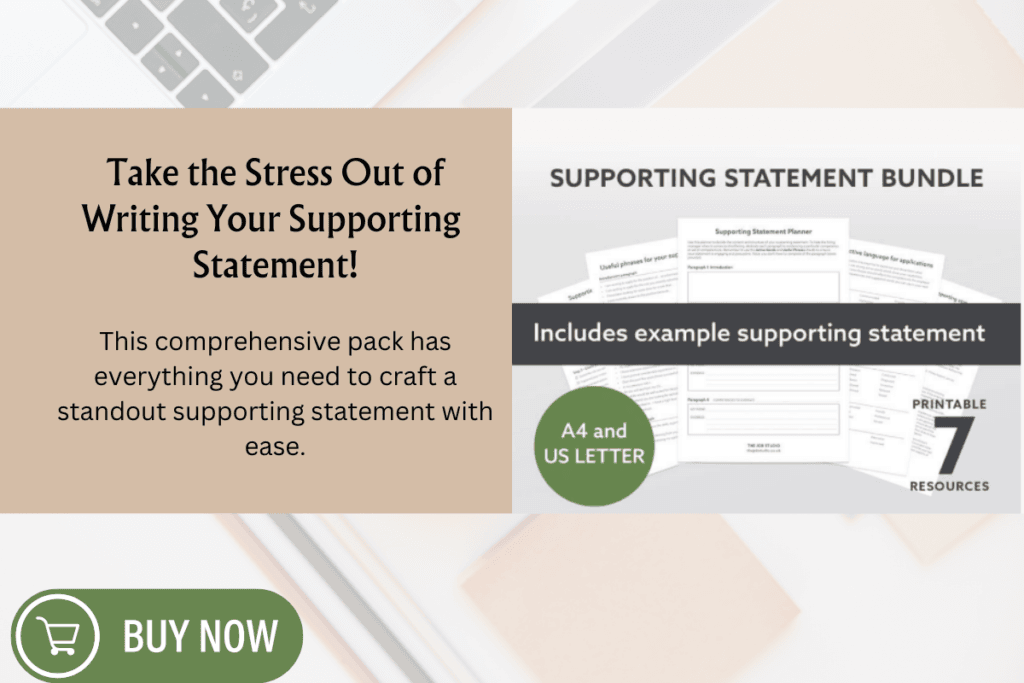What You’ll Gain
- Understand How to Write an NHS supporting statement or supporting information and its purpose.
- Learn how to structure your statement to highlight your experience, skills, and values.
- Discover impactful words and phrases to make your statement stand out.
- Get access to an example supporting statement bundle you can adapt for your application.
Introduction
The NHS supporting statement section of your application form is your chance to shine.
It’s where you sell yourself and show why you’re the perfect candidate for the role.
But writing a compelling statement can feel overwhelming, especially when you’re competing against other skilled professionals.
Imagine this: You’re confident in your abilities and your application, but your supporting statement lets you down because it’s generic or poorly structured. That won’t happen to you after reading this guide. By the end of this post, you’ll have the tools to craft a statement that truly showcases your skills, experience, and alignment with NHS values.
Want to see an interview-winning supporting statement for a job application? I’ve included our Printable Supporting Statement Bundle.
In this guide, I’ll walk you through everything you need to know about writing an exceptional supporting statement. You’ll learn what to include, how to align your application with the NHS values, and how to use specific language to grab the assessor’s attention. Plus, I’ll share an example statement you can adapt for your needs.

What is the NHS Supporting Statement Section?
The supporting information section is a key part of the NHS application form. This is where you explain why you’re the best person for the job by demonstrating:
- How your skills and experience meet the job requirements.
- Your understanding and alignment with NHS values.
- Your ability to fulfill the duties outlined in the job description.
The goal is to convince the assessor that you’re a ready-made fit for the position.
Take the Stress Out of Writing Your NHS Supporting Statement!
Struggling to write a standout supporting statement that gets results? Say goodbye to the overwhelm with our Supporting Statement Bundle—your ultimate toolkit for crafting a polished, professional statement that lands interviews.
Expertly compiled by a seasoned Career Coach, this instant digital download equips you with everything you need to confidently showcase your skills, achievements, and suitability for any job role. Whether you’re applying for an administrative position, a healthcare role, or something entirely different, our bundle simplifies the process so you can focus on standing out.
What’s Inside the Bundle?
Interview-Winning Supporting Statement Example – See exactly what works with an expertly written sample, easily adaptable for various roles.
How to Write a Supporting Statement Guide – Step-by-step instructions to help you organize and articulate your achievements.
Supporting Statement Planner – Map out your experiences, strengths, and key accomplishments effortlessly.
Competency Matching Grid – Match your skills to job requirements and create a targeted, compelling application.
Supporting Statement Checklist – Ensure your final draft is flawless and ready to impress recruiters.
List of Over 200 Active Words – Supercharge your statement with dynamic, impactful language.
List of Useful Phrases – Overcome writer’s block with ready-to-use expressions that make your application shine.
Ready to transform your job applications? Download the bundle now and take the first step toward career success!

What to Include in Your NHS Supporting Statement
Your supporting statement is a crucial part of your NHS job application, and it should cover these five critical areas:
1. Main Duties and Responsibilities
Include specific examples from previous roles where you:
- Helped others and worked in a team.
- Delivered excellent service.
- Adhered to rules and procedures.
2. Skills and Knowledge
Highlight relevant skills, such as:
- Leadership during tasks or projects.
- Communication and listening skills.
- Problem-solving under pressure.
- Managing challenging situations.
3. Voluntary Work or Personal Care Experience
Mention any voluntary work or personal caregiving experience. This demonstrates empathy, moral values, and a caring attitude—all crucial for NHS roles.
4. Presentations, Research, or Publications
Detail any research, presentations, or publications that show your ability to gather, analyze, and communicate information effectively.
5. Employment Gaps
Explain any gaps in your employment with positive, relevant reasons—such as caring for a family member, traveling, or pursuing further education.
Adding Relevant Examples to Each Section
To make your NHS supporting statement truly impactful, add specific and relevant examples under each section. Here’s how:
Main Duties and Responsibilities: Instead of simply listing duties, provide an example of a challenge you overcame or an achievement. For instance:
*”While managing patient records, I implemented a new filing system that reduced retrieval time by 30%.”
Skills and Knowledge: Use real scenarios to demonstrate your skills. For example:
*”During a high-pressure shift, I successfully coordinated a team response to an emergency, ensuring all patients received timely care.”
Voluntary Work or Personal Care Experience: Highlight impactful moments. For instance:
*”While volunteering at a care home, I organized weekly activities that improved residents’ engagement and mood.”
Presentations, Research, or Publications: Mention specifics. For example:
*”I presented a paper on patient-centered care at the 2023 Healthcare Summit, which was well-received by attendees.”
Employment Gaps: Show growth during gaps. For example:
*”During my career break, I completed a certification in data analysis to enhance my skill set.”
Adding relevant examples not only enriches your statement but also provides concrete evidence of your capabilities, making your application stand out.
Additional Tips for Crafting an Impactful Supporting Statement
Creating a standout supporting statement involves more than listing skills and achievements. Here are some additional tips to elevate your statement:
Show Your Passion for the Role
Your enthusiasm for the position should shine through your words. For example:
*”I have always been inspired by the NHS’s dedication to delivering quality care, and this role aligns perfectly with my passion for making a difference in patients’ lives.”
Use the STAR Method
When describing achievements, use the STAR (Situation, Task, Action, Result) framework. This approach ensures your examples are clear and compelling. For instance:
- *”During my time at ABC Hospital (Situation), I was tasked with reducing patient wait times (Task). I introduced a new scheduling system (Action), which reduced wait times by 20% within three months (Result).”
- *”As a team leader at XYZ Clinic (Situation), I was responsible for improving team communication during shift handovers (Task). I implemented a standardized reporting protocol (Action), leading to a 25% reduction in errors reported during shift changes (Result).”
These detailed examples show your ability to identify issues, take initiative, and achieve measurable results.
Related Blog Posts in This Series
This blog post is one of a series to help you craft the perfect supporting statement. Check out other posts in this series:
How to Write a Supporting Statement for a Nursing Job or Healthcare Assistant Job with Examples.
How to Write a Personal Supporting Statement with ChatGPT

Highlight Transferable Skills
If transitioning from a different sector, emphasize skills relevant to the NHS. For example, “In my previous role as a project manager, I developed exceptional organizational skills and the ability to manage complex tasks, which I now apply to coordinating patient care and healthcare team activities.”
Avoid Generic Statements
Be specific about your contributions. Instead of saying, “I’m a team player,” describe a time when teamwork led to success: “While collaborating with my colleagues on a patient care initiative, we implemented a strategy that improved patient satisfaction scores by 15%.”
Demonstrate Problem-Solving
Employers value candidates who can navigate challenges effectively. For example, “In my previous role, I identified inefficiencies in our patient discharge process. I proposed and implemented a new checklist system, which improved discharge times by 25%.”
Powerful Words and Phrases to Use in Your Statement
Using these keywords in your statement can make it more impactful:
- NHS Values: Example: “Having studied and learned the NHS values, I understand their importance in delivering outstanding treatment and care.”
- Job Description: Example: “Before applying, I thoroughly reviewed the job description to ensure my skills and experience align with the role’s requirements.”
- Collaboration: Example: “I excel in collaboration, working effectively with multidisciplinary teams to achieve shared goals.”
- Commitment to Quality of Care: Example: “I am deeply committed to delivering high-quality care tailored to each patient’s needs.”
- Flexible and Adaptable: Example: “I am flexible and adaptable, ready to take on additional responsibilities when required.”
- Respect and Diversity: Example: “I value diversity and ensure respect for everyone I work with, listening attentively to their needs.”
- Taking Ownership: Example: “I take ownership of challenges, ensuring they are resolved efficiently and professionally.” Explore over 200 powerful phrases to use in each section of your supporting statement here
Emphasizing the First Paragraph of Your Statement
Your first paragraph is critical. It serves as the hook that captures the assessor’s attention immediately. This section should be a concise summary of the strongest points in your supporting statement. Highlight your most relevant skills, experiences, and how you align with the person specification for the role.
For example:
“Thank you for considering my application for the [Job Title] position. With over [X years] of experience in [specific field], I bring a proven ability to [key achievement]. My background aligns perfectly with the requirements of this role, including expertise in [specific skill or knowledge area] and a commitment to the NHS values of respect, diversity, and quality care.”
An engaging and well-crafted opening paragraph ensures your application stands out and motivates the assessor to read the rest of your statement.
Example NHS Supporting Statement Template
Here’s an example script for your NHS supporting statement:
Thank you for the opportunity to apply for this position. Having reviewed the job description, I am confident my skills, experience, and values align perfectly with this role. Over the years, I have gained valuable experience in [specific duties], which have prepared me to deliver exceptional results.
For example, in my role as [Previous Job Title] at [Organization], I [specific achievement, e.g., implemented a new system that reduced patient wait times by 20%]. These experiences have honed my skills in [relevant skill, e.g., teamwork, problem-solving, or leadership].
In addition to my professional experience, I actively embody NHS values such as respect, diversity, and a commitment to quality care. I am passionate about making a positive impact in the lives of patients and contributing to the success of your organization.
Explore full version here.
Mindmap: Key Points for NHS Supporting Statement
- Introduction: Show enthusiasm and reference the job description.
- Main Duties: Highlight teamwork, customer service, and following procedures.
- Skills and Knowledge: Communication, adaptability, and problem-solving.
- Voluntary Work: Demonstrate empathy and moral values.
- NHS Values: Respect, diversity, and quality care.
- Conclusion: Reinforce suitability and end with gratitude.
Conclusion
Crafting an excellent NHS supporting statement is about aligning your skills, experience, and values with the job requirements. Use the strategies and examples in this guide to create a statement that stands out. Want to see what an excellent supporting statement looks like? I’ve included an interview-winning Printable Supporting Statement examples.
If you found this guide helpful, share it with others who may benefit! If you have questions or need personalized advice, leave a comment below, and I’ll be happy to assist.

Frequently Asked Questions (FAQs)
How do I start an NHS supporting statement?
Begin with a concise summary highlighting how your skills and experience align with the job’s person specification. Thank the employer for the opportunity and reference the job description. Mention key qualities or accomplishments that set you apart, such as specific expertise or achievements directly related to the role.
What should I include in my NHS supporting statement?
Include your main duties, relevant skills, voluntary work, understanding of NHS values, and explanations for any employment gaps. For example, under main duties, you could highlight managing patient care schedules or improving workflow efficiency—such as “I developed a system that reduced appointment wait times by 20%.” For relevant skills, you might include examples like “effectively handling conflict resolution during team meetings” or “leading a training program that enhanced team performance.” If referencing voluntary work, you could say, “While volunteering at a hospice, I organized events to improve patient morale.” For NHS values, mention specific actions that align with them, such as “I consistently treat colleagues and patients with respect by fostering an inclusive environment.” And for employment gaps, highlight growth opportunities, like “During my career break, I completed a diploma in healthcare management to better equip myself for leadership roles.”
How long should an NHS supporting statement be?
Aim for 500-1,000 words, depending on the job requirements. Ensure it’s concise but comprehensive. For example, if you’re applying for a nursing role, a focused 700-word statement could emphasize your patient care experience, teamwork, and ability to handle emergencies. If it’s a managerial role, closer to 1,000 words would allow you to detail leadership achievements, process improvements, and alignment with strategic goals, such as “streamlining patient intake processes to reduce wait times by 15%.” Tailor the length and content to match the complexity of the role.
How can I demonstrate NHS values in my statement?
Mention specific values such as respect, compassion, and a commitment to quality care, and provide examples of how you’ve demonstrated them in your work. For instance, you could describe a time when you ensured inclusivity in a team environment, like “During a multidisciplinary team meeting, I made it a priority to encourage input from all members, ensuring every voice was heard and valued, which led to a more comprehensive care plan for the patient.” Alternatively, highlight compassion by sharing a specific patient interaction: “While caring for an elderly patient with limited mobility, I took extra time to ensure they felt comfortable and respected, adapting my approach to meet their individual needs.”
Can I use the same supporting statement for multiple NHS applications?
While you can use a template, tailor each statement to the specific job description to stand out. For example, if applying for a nursing role, emphasize specific achievements such as “During my time at XYZ Hospital, I developed a patient care program that improved recovery times by 15%.” For managerial roles, detail leadership experiences, like “I successfully led a team of 10 in implementing a new records management system, which reduced errors by 20%.” Tailoring ensures your statement resonates with the assessors and highlights your direct relevance to the role.
It’s Time
Ready to write your own standout NHS supporting statement? Download the supporting statement bundle that contains all you need to get started today. Don’t forget to like, share, and comment if this guide has been helpful. Together, let’s make your dream NHS job a reality!




